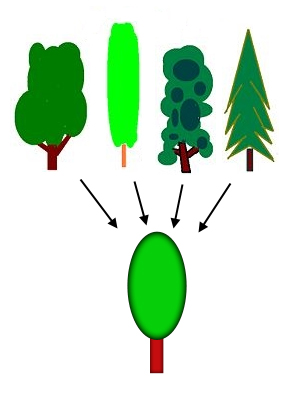I learned about this but forget its name. The idea is that when people hear a word or think of a concept they tend to come up with certain examples that fit the idea more than others. For example, if people think of birds, they tend to think of sparrows or seagulls, not penguins, even though penguins fit the definition of bird perfectly. If people are told to imagine a chair, they tend to think of one with 4 legs, probably made of wood, not something like a movie theater chair. What's the name for this?
-
$\begingroup$ I'm not certain if this is what your taking about, but Familiarity heuristics is similar. en.wikipedia.org/wiki/Familiarity_heuristic $\endgroup$– Snarky CatCommented Jul 28, 2016 at 9:36
-
$\begingroup$ Availability bias I believe $\endgroup$– Robin Kramer-ten HaveCommented Jul 28, 2016 at 13:40
-
$\begingroup$ "What is the capacity for abstract thought?" is an interesting question indeed. Not all humans have it actually...to form in one's mind an idea that has no semblance of anything. Perhaps an interesting line of inquiry is "why do we see images when we dream?" I've never heard of anyone dreaming "in the abstract" (meaning of squares and circles.) Maybe some do though? $\endgroup$– Doctor ZhivagoCommented Jul 29, 2016 at 20:00
1 Answer
You are talking about Prototype Theory:
... any given concept in any given language has a real world example that best represents this concept. For example: when asked to give an example of the concept furniture, a couch is more frequently cited than, say, a wardrobe.
Specifically, the "graded categorization" (degree) property of prototypes:
For example, robins were seen as being "birdier" than ostriches ...
This contrasts with Exemplar Theory, which proposes that categories are based on all examples rather than one or a few:
For example, the model proposes that people create the “bird” category by maintaining in their memory a collection of all the birds they have experienced: sparrows, robins, ostriches, penguins, etc. If a new stimulus is similar enough to some of these stored bird examples, the person categorizes the stimulus in the “bird” category.
Other theories on categorization (or how a Concept is structured in the mind) include Essentialism, Theory-theory, and Bayesian Inference.
